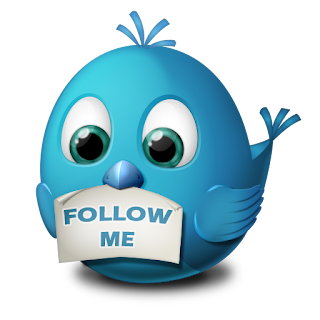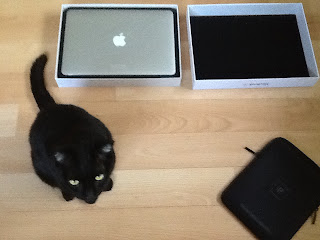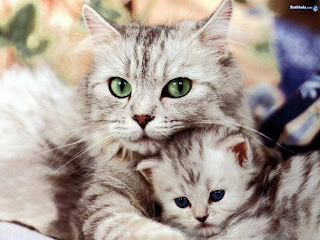 |
| Get More Tweeters In Your Nest |
Yesterday a friend asked me how he could increase his Twitter following. As we chatted I realized some of you might wonder the same thing so I'm posting my answer.
When I began Tweeting I had no idea how to attract followers. I had about 20 and I wanted more because I thought that would be a great way to reach out to other readers and writers.
Today I have over 6,000 followers but I've learnt that it's not about the number of people following me, it's about the connections I've made along the way. The tips I'm about to give aren't meant to get you--as certain advertisements announce--5,000 followers in two days. You could do that, well you could probably easily get 5,000 followers after a couple of months, but I don't think it would mean anything because you would have no connection to any of those people.
What I'm going to discuss are ways you can use your Twitter account
to build, as Seth Godin says, a tribe. A community.
1. Form a tribe
When you first start tweeting you aren't following anyone and you have no followers. Who are you going to follow?
I'm a writer so I followed the people I think of as mentors:
Elizabeth Spann Craig,
Joe Konrath,
Dean Wesley Smith and
Kris Rusch.
Chances are that the people your mentors follow, as well as the people who follow them, are going to be people you'll want in your tribe. Take a look at their tweets, look at their blogs, their websites. If you decide you want to make a connection with them then follow them.
An Example
Clear as mud? Let me give you an example of what I mean. This is an image of the top part of Elizabeth Craig's Twitter page.
Notice that, on the far right hand side (you can click on the image to enlarge it), three lists are mentioned:
1) The list of her tweets, labeled TWEETS (22,531),
2) The list of the people who she is following, labeled FOLLOWING (12,065),
3) The list of the people who follow her, labeled FOLLOWERS (14,710).
If you right-click Elizabeth's FOLLOWING list you'll be presented with a list of everyone she is following. Tale a look at a few of these folks. Read their biography, look at their tweets. If they list a website or blog in their bio then go take a look. If he or she seems like a person you'd like to reach out to, then follow them.
Don't expect your new acquaintance to follow you back, especially not right away. Read their tweets and reply when it feels natural and build up a content rich twitter feed. I've found that, most of the time, people follow back.
Note: I mentioned, above, looking at the list of people a person follows (FOLLOWING), but you can also look at the list of people who follow them (FOLLOWERS). Although this is more hit-and-miss since anyone can follow anybody, I've met some wonderful people this way.
Now that we are following a few people, and a few people are following us, what next?
2. Don't use the default portrait
This is a big no-no since many of the people who create bots send them out into the world with the default portrait. Besides, I think it's best to have the same profile picture for all social media and no one wants that to be the Twitter egg!
Ideally your portrait would be a picture of you but if you're shy, or on the FBI's most wanted list, you could take a picture of your hand or of your pet.
3. Have a biography
It doesn't have to be witty, just tell folks what you do and what you're interested in using 140 characters are less. If you don't have a biography a lot of folks will think you're a bot and you don't want that.
4. Include a link to your website
You're allowed to list a link just below your Twitter bio. This is a fabulous opportunity to let folks know who you are, what you stand for, what you're interested in, and in MORE than 140 characters! If you don't have a website, no problem. Include a link to your blog,
Tumblr or Facebook account.
5. Include your location
This tip isn't going to apply to everyone, but if you're like
miss604.com, a blogger who talks about what is happening in the 604 area code, it can be a terrific asset.
6. Don't follow back everyone who follows you
I know this advice may seem counter-intuitive but if your goal is to build a community then why would you follow the guy who, in his bio, promises to tell you how to get 5,000 followers in 1 day, or how to make 10,000 dollars a month working from home? These are scams, the electronic equivalent of junk mail. We don't save junk mail, we recycle it.
Also, if you fill up the list of people you follow with scammers then Twitter will start to suggest your account to scammers as someone they might like to follow. On the other hand, if you only follow people you genuinely want to make a connection with then Twitter will pick up on that and start to mention your Twitter account to these kind of people. Nice!
Don't feel obligated to follow someone just because they've followed you. You know that not everyone you follow will follow you back. Folks understand this.
7. Interact with your followers
I've said this before, but it deserves its own point. Don't be shy about replying to tweets or joining conversations that are already in progress. If you're worried how your input will be received you can say something like, "I don't mean to intrude in, but ...".
Do reply to tweets if you have something to say. I love it when folks, whether or not they follow me, reply to something I've tweeted. Feedback is great and it's one of the best ways to build a community.
8. Don't just tweet, retweet
If you find a tweet you think your tribe would like, retweet it. It's also a great way of thanking someone for retweeting one of your tweets.
Twitter trivia: If you include a tweeters name (@theirname) in your tweet then Twitter will let them know you mentioned them in your tweet. BUT if you include a tweeters name as the very first thing in your tweet it will only be visible to anyone who follows both you and @theirname.
9. If you like a tweet and want to remember it, mark it as a favorite
This is convenient--you'll be able to find it again--and Twitter will tell the person who tweeted that you liked it. Win-win!
10. Participate in events like #FF (Follow Friday)
This is your opportunity to acknowledge those tweeters who have influenced you and say thank you. These can be people who follow you, but they don't have to be. Also, since you're using a hash-tag (more on this later), your tweet will expose you to new people.
11. Use hashtags (#)
One of the most powerful ways to grow your audience is by using hashtags (for instance, #writing #publishing #amwriting). Since people can do a search on hashtags, or build up a list on the basis of a hashtag, using hashtags allows you to get your tweets in front of people who do not follow you.
For more information about hastags head on over to
hashtags.org or
do a search.
12. Don't spam
Don't try and sell something, even if you have something to sell. Just be yourself. Twitter isn't for hocking a product it is for connecting with people. Asking them to buy a new and improved widget won't do that.
You have a link in your Twitter bio to your website/blog/webpage that has information about your books--or whatever it is you'd like folks to know about--don't try and sell anything in your tweets.
That's not to say you shouldn't send out the occasional link to a good review of your book or announce that your book has gone on sale, etc. After all, a good review is omething you feel great about and you'll naturally want to tweet about it. On the other hand, if someone lets their followers know for the 14th time in 20 tweets that their book is on sale for $4.99 at Amazon, people are going to tune that person out and unfollow.
I read somewhere that a ratio of 1 self-promotional tweet for every 10 tweets is a comfortable ratio. Sounds good to me.
13. Link to your social media to your Twitter account
Don't forget to link to your twitter account from your other accounts. For instance, Facebook, your blog/website, Tumblr, and so on.
Also, if you're chatting with people in the real world, and they seem interested, don't be shy about mentioning you're on Twitter. If you're a writer this is especially true. I've found that at writing conferences nearly everyone brings business cards or bookmarks to hand out--it sure beats struggling to find a pen and a piece of paper!
14. Tweet pictures
People love pictures. If you doubt this, look at the popularity of
Pinterest. One of my most popular tweets was of a gorgeous picture named, "Church of Trees, Belgium". (Here's
a link to the blog post.)
 |
| Church of Trees, Belgium |
You can tweet any media you like, even video. Mix it up, variety really is the spice of life.
15. Run a contest
Many writers have used contests to grow their email lists but this can also be used to grow ones Twitter following.
For instance, you could offer to send everyone who follows you on Twitter in the next week a free ebook. Or, in conjunction with your contest to help grow your email list, you could say that to enter folks would need to subscribe to your website
and your Twitter feed.
In order to do something like this, though, you'd probably need to offer an attractive prize, perhaps something along the lines of an ereader. Also, folks generally don't like to be manipulated so proceed with caution.
16. Learn from your mentors
At the beginning of this article I talked about your mentors, people who are successfully doing what you want to do. Study their tweets.
What
kind of tweets do these people use? Text, pictures, video? If they use video do they use Vimeo or YouTube? Do they have their own website or just a blog? Do they use Blogger? Wordpress.com? Tumblr? If your mentors are craftspeople, do they tweet much about their shows, and, if so, pay close attention to what they say and how they say it, especially when it doesn't work (in other words, when it seems like spam).
This is like the advice given to writers to read everything, the good, the bad and the positively horrible because it trains one to recognize what works for you and what doesn't. Chances are that if something seems spammy to you it'll seem spamming to a lot of other folks as well.
17. Use programs like ManageFilter, Tweepi and Hootsuite to help you manage your account
There are two main kinds of programs:
managing programs and
scheduling programs. Often one program can do everything, but not always.
Managing programs (Example: ManageFlitter, Tweepi)
Sometimes you may want to unfollow those who have left Twitter. If you have 10 or 20 followers it wouldn't take long to look at each account and see when he or she had last tweeted. If the user has been inactive for over, say, six months, then you might decide to unfollow them.
But what happens if you have over 100 followers? Over 1000? You could still do it manually but it would be a mind-numbingly boring task, and those things are best left to programs. I'm not saying you
should unfollow these folks--life happens--but if this is something you want to do then these programs will help you do it easily, quickly and (depending on the plan you choose) cheaply.
Scheduling programs (Example: Hootsuite)
There have been times when I've come across six links that I've desperately wanted to tweet about, all in the span of 15 minutes. If I did that, though, my followers wouldn't be happy with me because--no matter how good the links were--they would consider it spam.
I usually tweet between five and six times a day and it works best if the tweets are more or less evenly spread out, so I use Hootsuite to help schedule tweets.
Note about pricing: All the programs I've mentioned, at the time of writing, are free to start, but usually you only get a limited set of features if you don't pay any money. This does, however, give you the chance to see firsthand what features each program provides, what the interface looks like, whether you find it easy and intuitive, etc.
18. Use lists
If you're at all like me you'll eventually end up following a lot of people. Some people are going to be your real life friends, some are going to be work contacts, some are going to be interested in your hobbies, some are going to share current news articles. How does a person keep up with all this information?
I use lists.
One list I use often is my
News list. Here I've included writers who tweet about how to become a better writer and the publishing industry. When I want to read about those topics, I go to that list. (By the way, list management is something I find Hootsuite great at. And, just in case you're wondering, I'm not affiliated with Hootsuite in any way.)
Hopefully that will give you an idea of the power of lists. Also, lists can be public or private. Other Twitter followers can subscribe to your lists and this is a great way of finding people who share your passions.
19. Have fun!
At its most elemental level, Twitter exists as a way to relax, have fun and socialize. It can also be a powerful way to grow a network, even a tribe/community. But it's not going to work if you don't relax, be yourself and just have fun.
Happy tweeting! If you'd like to visit me on Twitter, click here:
Karen Woodward's Twitter Page. Cheers!
Related reading:
-
Tweepi: Helps You Manage Your Twitter Account
-
Twylah: Turn Your Tweets Into A Blog
-
Hootsuite for Twitter: 5 out of 5 stars
-
Seth Godin: The Best Thing Since Sliced Bread













